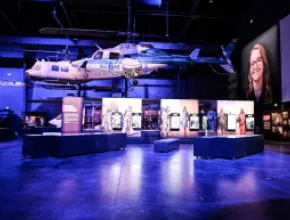At least 30 North American destinations carry the “Queen City” moniker, including Cincinnati, Denver, Toronto and Burlington, Vt. Original honors, however, go to North Carolina’s Charlotte, founded in 1768 as “Charlotte City” after King George III’s wife, Queen Charlotte of Mecklenburg-Strelitz.
Facing challenges arising last year from current state legislation (referring to House Bill 2, or HB2, limiting certain individual LGBT-related rights), the “Queen” rose to the occasion, with tourism and convention leaders reaffirming their commitment to highlighting the strengths in diversity of the overall Charlotte community.
The charter includes investing in the future. More than 8,367 new hotel rooms are currently under construction or in the planning phase for the Charlotte region through 2020, including 2,228 for Center City, more than doubling current inventory.
Featuring recently added free, higher-speed Wi-Fi throughout the facility, the Charlotte Convention Center is planning for major enhancements that will create additional meeting and breakout space while adding more connectivity to surrounding city amenities.
Along with neighboring Cabarrus County, the Queen City continues to reign as a Southern seat for majestic meetings.
Royal Flush
In line with the past five years, 2016 was another record-setting year for Charlotte in terms of hotel demand, hotel performance and Charlotte Convention Center revenue, as Mike Butts, vice president of sales for the Charlotte Regional Visitor Authority and executive director of Visit Charlotte, explained.
“Many of our 2016 meetings and conventions had higher attendance than in past years in other locations,” Butts said. “Highlights included the Veterans of Foreign Wars, which attracted 9,000 attendees, generated 9,500 room nights and brought national exposure as both presidential candidates addressed the convention. Three large medical conventions, including the American Association for Laboratory Animal Science National Meeting, which returns in 2020, drew 12,500-plus combined attendees, who utilized some 29,000 room nights.”
Charlotte’s winning streak is set to continue this year.
“We are looking toward another record-breaking year in 2017,” said Bill McMillan, Visit Charlotte’s senior director of sales. “Bookings include three major conventions in July, among them the International Association of Fire Chiefs, bringing approximately 7,500 attendees.”
Scheduled for August at Quail Hollow Club in South Charlotte, the PGA Championship puts the national spotlight on Charlotte, and by the PGA’s own estimate will deliver approximately $100 million in economic impact. In November, the National League of Cities brings some 8,000 attendees to the city, while 2018 kicks off with the American Football Coaches Association annual convention and American Bus Association’s Marketplace, the latter returning to Charlotte for the third time.
In regard to North Carolina’s HB2 legislation, the Queen City is dedicated to warm welcomes for all.
“Genuine hospitality and memorable customer service are city signatures that remain constant, even as Charlotte, one of the fastest-growing cities in the U.S., continues to add and improve amenities that make us even more competitive,” Butts said. “Our tourism community truly understands the value of the meetings industry, and comes together to offer truly holistic support.”
Once in town, the winning hand continues with richly rewarding cross-category experiences for groups.
Top Draws
Charlotte’s culinary banquet includes a trio of operators offering private tours of restaurants, breweries, wine bars and other F&B coordinates in neighborhoods including Uptown, the historic South End and NoDa arts and entertainment district.
On Feast Food Tours, private groups of eight to 16 people meet local culinary artisans and tastemakers on customized experiences. Tour De Food’s unique samplings span fine dining to local dives. Charlotte NC Tours offers everything from “sprawling parks and tree-lined streets to cornbread and chicken wings” by foot, bike, van or Segway.
Groups can also enjoy private events and classes at Chef Alyssa’s Kitchen, while The Olde Mecklenburg Brewery, known locally as OMB, offers award-winning tours, event space and off-site services.
Outdoor enthusiasts have the globally preeminent U.S. National Whitewater Center. Complementing its signature asset—a multichannel whitewater river with class III-IV rapids for rafting and kayaking—the 1,300-acre facility also features 30-plus miles of mountain biking and running trails, a climbing center, ziplines and challenge courses, with customizable team development and educational programs for groups.
Cultural riches include the outstanding institutions forming the Levine Center for the Arts. Walkable from the Charlotte Convention Center, these include the Bechtler Museum of Modern Art, offering docent-led tours and versatile space for up to 400 people, plus classroom space for 30-person meetings. The slender Harvey B. Gantt Center for African-American Arts + Culture has breathtaking views from its 150-person capacity Rooftop Pavilion, while the striking five-story Mint Museum Uptown houses the internationally renowned Mint Museum of Craft + Design.
Opened in 1936, the Mint Museum Randolph in Charlotte’s Eastover neighborhood was the state’s first art museum, with a new outdoor tent for gatherings of up to 400 people.
The Queen City earned its other “Hornet’s Nest” moniker for its rebellious ways during the American Revolution. The Mecklenburg Historical Association offers docent-led tours of Revolutionary-era sites along Uptown’s Liberty Walk.
Located on an eight-acre wooded campus in east Charlotte, the event-capable Charlotte Museum of History includes the circa-1774 Hezekiah Alexander House, Mecklenburg County’s oldest surviving home.
At the Levine Museum of the New South, renowned for its permanent exhibit Cotton Fields to Skyscrapers, rental options include full buyouts for 600, with access to the exhibits included for all events. Other local treasures include the event-capable NASCAR Hall of Fame, featuring more than 50 interactive exhibits, and Billy Graham Library.
Court Side
Versatility equally defines neighboring Cabarrus County, where the Charlotte Motor Speedway, located in the county seat of Concord, or “Speed City USA”, symbolizes the destination’s high-octane group appeal.
“In 2016, the Cabarrus County CVB team generated over 80,000 room nights for hotel partners with events like the 2016 Regional Meeting for the North Carolina, Virginia and South Carolina Motorcoach Associations,” said Donna Carpenter, Cabarrus County CVB president & CEO. “Racing, in a variety of forms, is what we do best of course, so we’re particularly excited to welcome back the Tough Mudder and Spartan Race obstacle runs in 2017.”
Cabarrus County is home to just over 3,000 rooms, including 30 hotels with 1,800 rooms in Concord.
Hosting more than three-dozen automotive and motorsports events each year, the mighty Charlotte Motor Speedway also offers behind-the-scenes tours and event space.
Groups itching to get behind the wheel have multiple options, including the NASCAR Racing Experience and Richard Petty Driving Experience.
Groups can also tour various NASCAR team shops and attractions, and go-kart around the quarter-mile Superspeedway track at oval-shaped mega-retail center Concord Mills.
Downtown Concord’s charms include the Cabarrus County Courthouse, which is on the National Register of Historic Places, and the Davis Theatre. Near downtown, The Depot at Gibson Mill is one of the Southeast’s largest antique malls.







